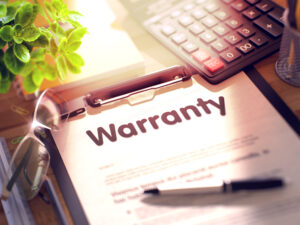
Extended warranties: Don’t pay extra for nothing
Last updated on August 8th, 2024
Salespeople will often try to persuade you that extended warranties are the best way to protect yourself against expensive repairs in the future. Don’t be fooled.
What many Australians don’t realise is they are protected under Australian Consumer Law and that, more often than not, the extended warranty being offered covers the same period and rights to repairs or replacement. This is why it’s often referred to as ‘junk insurance’.
In other words, you’re paying for something that is available for free. It’s like taking out another insurance policy when you’re already covered. So why do so many retailers push extended warranties? And is there any occasion when it’s worth shelling out the extra dollars?
What is an extended warranty?
An extended warranty in Australia, also commonly referred to as a service contract or protection plan, is essentially a prolonged warranty offered to consumers in addition to the standard warranty that comes with a product. It is intended to cover certain costs associated with repairs, replacement parts, or sometimes even maintenance, once the standard warranty has expired.

Unlike a standard warranty, which is included in the purchase price of the item and typically covers any manufacturing defects or faults that arise within a predefined period, an extended warranty usually kicks in after this initial warranty period has ended. They're designed to safeguard against the cost of future problems with the product.
For example, car manufacturer warranties usually cover three to five years of repairs. Beyond that, they might offer you an extended car warranty. So, where the standard warranty is a guarantee from the manufacturer that the product will work as advertised for a specific period, the extended warranty is more of an insurance policy against the future possibility of mechanical breakdown or technical problems.
Who offers extended warranties?
Retailers, manufacturers and third-party warranty companies usually provide extended warranties. Typically, the offer comes at the point of sale, often presented by a salesperson who might suggest that extra protection is in your best interest - when buying a sound system at JB Hi-Fi, or a refrigerator at Harvey Norman, for example.
At times, manufacturers may offer extended warranties directly, especially for higher-end products or vehicles. When you buy a car in Australia you might be offered a dealer extended warranty or a manufacturer extended warranty. The former may require you to have all your repairs done at that dealership and may not carry over to the next owner if you sell. Manufacturer extended warranties generally transfer from owner to owner and allow you to have the car serviced or repaired at any accredited provider.

Third-party warranty companies also sell standalone extended warranties that cover various products, often promising more comprehensive or longer-lasting coverage than retailers or manufacturers.
Some credit cards also offer extended warranty coverage as a perk. This applies to eligible purchases made with the card. The terms, conditions, and cover limits vary significantly but generally, this benefit can add anywhere from one to two years to the original warranty.
Extended warranties often overlap with consumer guarantees under Australian Consumer Law and do not necessarily provide you with any significant benefits above your consumer rights. They also often have many exclusions and limitations outlined in their fine print, such as restrictions on your choice of repair centres.
Consumer guarantees
Consumer guarantees are a comprehensive set of rights and remedies provided by law to consumers for goods and services. The retailer or manufacturer automatically provides these guarantees without any extra cost and cannot be overridden.
Key guarantees include that goods must:
-
- Be of acceptable quality
- Fit for their disclosed purpose
- Match their description or any sample or demonstration model
- On the other hand, services must be provided with adequate care and skill and fit for a particular purpose or achieve a specific result.
- If a product or service fails to meet a consumer guarantee, the consumer has a right to a remedy – a repair, replacement, or refund and in some cases compensation for damages and loss – which is provided by the retailer or manufacturer. The type of remedy will depend on whether the failure is major or minor.
Where consumer guarantees don’t apply
While consumer guarantees apply to most products and services sold to consumers, there are certain exceptions. The Australian Competition and Consumer Commission (ACCC) lists the following:
-
- Hiring or leasing a product
- Bundled products and services
- Private sales, where the seller isn’t running a business
- Auctions
- Products from overseas businesses
- Products and services bought before 2011
- Financial products
- Services to transport or store business goods
- Engineering and architect services
- Extended warranties
When is an extended warranty worth it?
The only time you should consider an extended warranty is if it provides benefits not already offered by consumer guarantees. The ACCC recommends asking the following questions before you decide:
![]()
-
- Does the extended warranty give greater protection than your statutory rights under the law? Before buying an extended warranty, ensure it doesn't just replicate the protections your statutory rights already provide.
- Remember, your right to a remedy when a product fails to meet a statutory condition or warranty has no fixed expiration; it's based on what is reasonable considering the product's cost and quality. This implies that your statutory rights could cover the replacement or repair of defective goods even after a voluntary or extended warranty expires.
- Are there any crucial limitations or prerequisites to be aware of? For instance, is the warranty only applicable if the product is serviced regularly? If it is, and servicing is not free, then it may cost you more in the long run.
- When does the extended warranty start? Some extended warranties begin on the purchase date, not after the expiration of the manufacturer's warranty.
- Is the proposed remedy equivalent to the original price of the product? Be aware that the value of remedies under some extended warranties may depreciate over time. This means you may only receive a partial refund of the purchase price or a lower-value product as a replacement if a problem arises.
- If the product needs to be shipped for repairs, who is responsible for the freight costs?
- Are there certain types of issues not covered by the warranty? Certain extended warranties might not cover accidental or water damage, for example.
If you are having trouble getting something repaired or replaced under an extended warranty, get in touch with us, and we’ll help you handle it.






